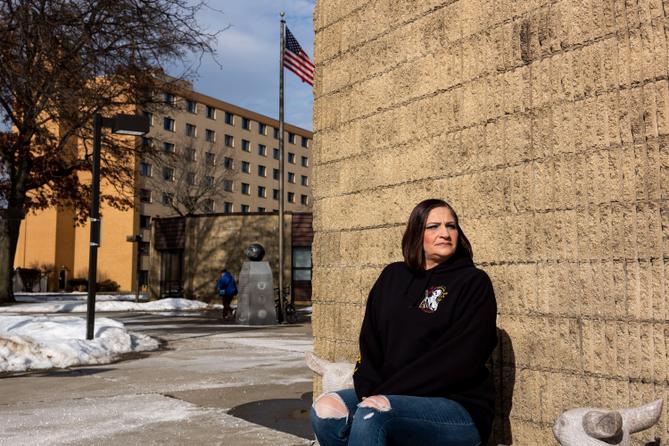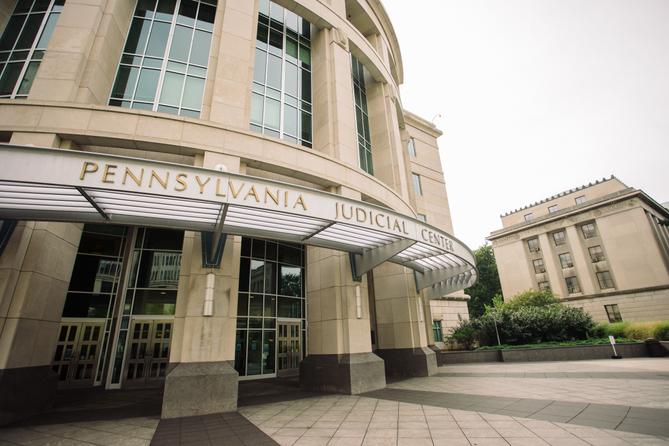Spotlight PA is an independent, nonpartisan newsroom powered by The Philadelphia Inquirer in partnership with PennLive/The Patriot-News, TribLIVE/Pittsburgh Tribune-Review, and WITF Public Media. Sign up for our free newsletters.
HARRISBURG — A fight between the U.S. Department of Justice and leaders of Pennsylvania’s court system is playing out in federal court — and the outcome could have major implications for people who experience opioid addiction and face criminal charges.
The federal agency sued the Pennsylvania court system in February, alleging that it discriminated against people with opioid use disorder. The Justice Department found that several county courts in the state system banned or limited the use of medication prescribed to treat addiction.
It’s now arguing that the entire court system is responsible, as Pennsylvania’s constitution gives the state Supreme Court “general supervisory and administrative authority over all the courts and justices of the peace.”
Attorneys for the Pennsylvania Supreme Court and its administrative arm are trying to convince a federal judge to dismiss the lawsuit. They argue that the court system does not have a “top-down” leadership structure like a corporation, but is instead made up of many parts each with their own responsibilities.
Here’s what you need to know about the case.
What are medications for opioid use disorder?
Three drugs — methadone, buprenorphine, and extended-release naltrexone — are approved by the federal government to treat opioid use disorder. All three are effective and save lives, according to a 2019 report from the National Academies of Sciences, Engineering, and Medicine.
For people with opioid use disorder, buprenorphine and methadone can reduce withdrawal symptoms and cravings without causing a euphoric high, according to a report from the National Institute on Drug Abuse, a federal agency. The medications allow patients to “function normally, attend school or work, and participate in other forms of treatment,” the report says.
The third drug, naltrexone, works to block the euphoric effects of opioid drugs, and the federal Substance Abuse and Mental Health Services Administration has found there is “no abuse and diversion potential with naltrexone.”
What does the Department of Justice allege?
The lawsuit focuses on people who are under a judge’s supervision.
The Department of Justice’s core argument is that people with opioid use disorder should have an equal opportunity to benefit from programs that serve as an alternative to incarceration — and creating unnecessary barriers to those programs is a violation of their rights under federal law.
The Justice Department began investigating Pennsylvania’s court system after receiving complaints about an opioid use disorder medication ban in Jefferson County in 2018. The ban caused “significant harm” to at least two people, the federal agency wrote in a letter of findings, which was publicly released in February.
The same letter alleged that both Jefferson and Northumberland Counties violated the Americans with Disabilities Act, and it identified six other counties it said have or had problematic policies for treatment court programs that serve as an alternative to incarceration.
In that February letter, the Department of Justice urged the statewide court system to make several changes — and it filed the federal lawsuit later that month when it wasn’t satisfied with the court system’s response.

What’s the harm of banning these drugs?
A Jefferson County court order that banned “opiate based treatment medications” in 2018 led Sonya Mosey to face a choice: Stop taking her physician-prescribed medication or have her probation revoked and go to jail.
Mosey had struggled with opioid addiction for more than a decade and weaning herself off the medication caused her to feel sick every day and fear the worst, she previously told Spotlight PA.
“Honestly, I knew I was going to relapse, and I was probably going to die,” Mosey said. “I knew my parents were probably going to have to bury me.”
After the judge lifted the ban, Mosey said she had “a spark of hope.”
Guidance from the federal Substance Abuse and Mental Health Services Administration warns against arbitrary time limits for using opioid use disorder medication. The 2019 report from the National Academies of Sciences, Engineering, and Medicine found people are about 50% less likely to die when treated long-term with buprenorphine or methadone.
What’s the Pennsylvania court system’s argument?
“There is no question that — particularly in the judicial system of a large state such as Pennsylvania — some mistakes will be made in the sixty judicial districts,” attorneys for the Pennsylvania Supreme Court and its administrative arm wrote in a court filing.
But they argued that the Department of Justice has failed to provide evidence of a systemic, statewide problem. Attorneys said that statewide court leaders already remind county courts that they must follow federal requirements and provide ample support to help courts satisfy their obligations. And they say the statewide system should not be held accountable for the supervision that judges provide at the local level.
They’ve raised a number of other technical arguments, as well, including whether the Justice Department has standing to sue.
What’s the Department of Justice’s argument?
The statewide system has the power and responsibility to ensure county courts do not adopt these types of blanket discriminatory policies, Department of Justice attorneys wrote. They argued that local courts are part of the statewide system, not separate legal entities, and that the statewide court system’s disability discrimination policies are “generic” and “insufficient.”
Attorneys for the Justice Department are asking a federal judge to order Pennsylvania courts to make a number of changes. They argue that the system should adopt or revise policies to explicitly state that no court within the system can discriminate against someone because they take prescribed opioid use disorder medication.
Are there legal challenges happening in other parts of the country?
In court filings, attorneys for Pennsylvania’s judicial system said the Department of Justice might be using the lawsuit “to set a national example to advance policies.”
Justice Department attorneys are increasingly using the Americans with Disabilities Act “to try to overcome some of the rampant discrimination that people with substance use disorders face,” according to a recent special report by STAT, a health-focused news organization.
In an April news release, the department pointed to the Pennsylvania lawsuit as an example of its broader response to the opioid epidemic. Kristen Clarke, assistant attorney general for the department’s civil rights division, said the agency is committed to using federal civil rights laws “to safeguard people with opioid use disorder from facing discriminatory barriers as they move forward with their lives.”
What do advocates think of the case?
“The court system needs to step up to the plate and make sure that these kinds of practices end immediately,” Sally Friedman, senior vice president of legal advocacy for the national Legal Action Center, told Spotlight PA.
Friedman’s organization represents Mosey and helped her fight the Jefferson County ban in 2018. Friedman said the state judicial system can’t turn a blind eye to discrimination when many of its courts are interfering with people’s civil rights — especially when that interference puts lives in danger.
What’s next?
The federal district court judge hearing the case has yet to rule on the court system’s motion to dismiss as of July 13.
WHILE YOU’RE HERE… If you learned something from this story, pay it forward and become a member of Spotlight PA so someone else can in the future at spotlightpa.org/donate. Spotlight PA is funded by foundations and readers like you who are committed to accountability journalism that gets results.
